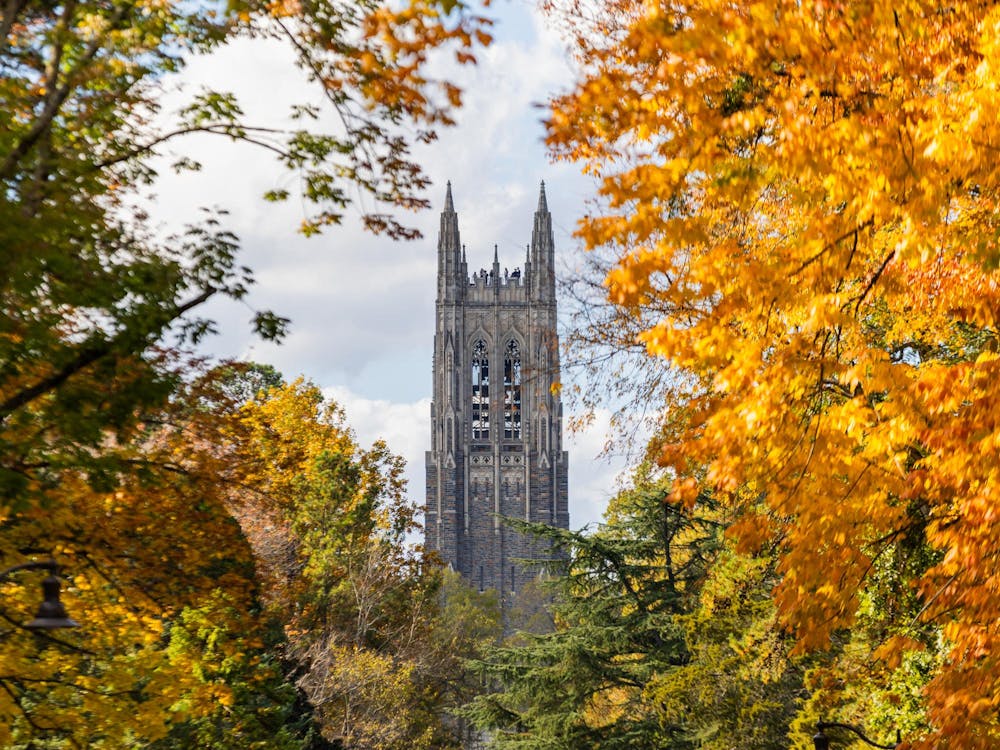While universities across the country are adopting policies of institutional neutrality, some Duke professors question whether neutrality is even possible for a university, and what the implications of adopting such a policy may have on an academic community.
Policies of institutional neutrality have gained renewed support across the country following controversies over campus protests. A recent faculty petition advocated for Duke leadership to follow a policy of abstaining from taking positions on political and social issues, and a Chronicle survey found that two-thirds of Duke faculty respondents support such a policy.
However, some faculty members worry whether institutional neutrality could make it more difficult for Duke to stand up for its students and scientific truth. Others question the very premise of such a policy.
“I would say that there isn't a position of neutrality,” said Ranjana Khanna, professor of English, women’s studies and literature. “So I would … therefore not push for neutrality, because I actually don't think it's possible.
The push for institutional neutrality gained momentum after the resignations of several elite university presidents due to their handling of campus protests over the Israel-Hamas war. A number of the institutions affected, most notably Harvard University and the University of Pennsylvania, have since adopted policies of institutional neutrality.
“It feels like at least some university leaders see institutional neutrality as a way to try to not get into more trouble by attempting to remove themselves altogether from taking a position,” wrote Orin Starn, professor of cultural anthropology and history, in an email to The Chronicle. “Personally, I'd like to see universities be on the record as for peace, justice, reconciliation in the Middle East and everywhere.”
For Khanna, the idea that an institution like Duke could be politically neutral overlooks the reality that institutions must continuously make choices, such as investment decisions, which she believes are inherently political. She noted that this act has been referred to as a “silent statement,” in which universities technically make a statement by investing in certain companies, even if certain values are not verbalized.
“So my feeling is that a statement in words would mean nothing if there hadn't been action on that part,” she said. “ … So therefore, why have a statement of neutrality when there is no neutrality? I feel like there's a little trick in it as well.”
The petition for institutional neutrality, which as of Nov. 12 was signed by 125 faculty members, argues that Duke leadership should only weigh in on contested social issues "on rare occasions when a public issue arises that directly affects the mission of this university" and in such cases, statements should only "articulate the significance of that issue to our campus community."
But recent campus events have highlighted the challenge of establishing such a strict boundary, particularly when student well-being and social issues become intertwined. After many Black students were targeted by racist text messages in the days following President-elect Donald Trump’s victory, Student Affairs sent an email to all Duke students characterizing the texts as “racist” and “abhorrent.”
Khanna reflected on the importance of standing up firmly and collectively on behalf of students, suggesting that the message should have been sent to the entire University community and that Duke “should have taken a stand and said that this [was] an assault on the University and its citizens.”
“I just don’t think it’s the time to be neutral … I don't want to hear from a student of mine who has received a message like that, that she got a message from Student Affairs saying, ‘if you want to report it, you can do so here,’” Khanna said. "This should not be an isolated pain, which is what it becomes. It should be a collective outrage.”
David Schanzer, professor of the practice in the Sanford School of Public Policy, broadly supports the idea of university leadership refraining from weighing in on "every world event or every incident that upsets people.” However, he agrees that universities should make statements that support vulnerable students, particularly those in the DACA program.
"[These students] are members of our community and our university should stand behind them in their effort to try to stay in this country to get an education," he said.
Schanzer also maintained that universities have a role to play in defending scientific truth, and that they should not be neutral “between the truth and falsehood.”
“I'm in favor of universities standing up for scientific truth as well. So yeah, vaccines work, climate change is happening and [is] changing our environment,” he said. “[But] what we should do about it, and whether a particular government is taking it sufficiently seriously or not? — I think that gets you mired in politics.”
Khanna added that a fundamental question of the debate is how to truly identify neutrality.
“I don't believe there is a position that any of us holds that is of political purity,” Khanna said. “We are here because of an endowment that came from tobacco money.”
Get The Chronicle straight to your inbox
Sign up for our weekly newsletter. Cancel at any time.
Darragh Senchyna is a first-year master's student in the Graduate School and a staff reporter for the news department.

